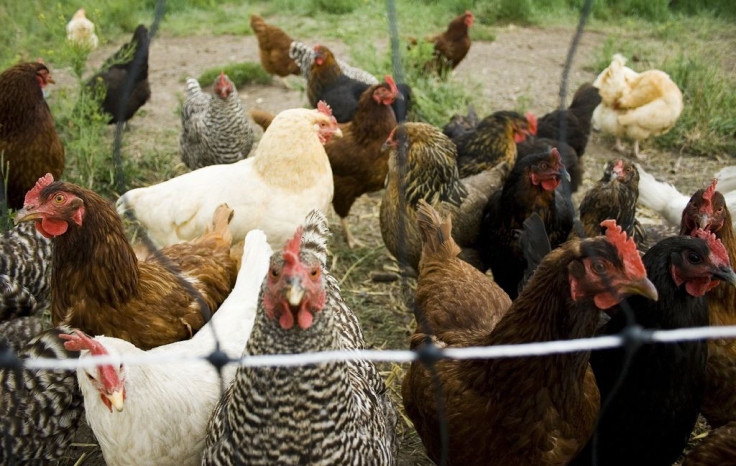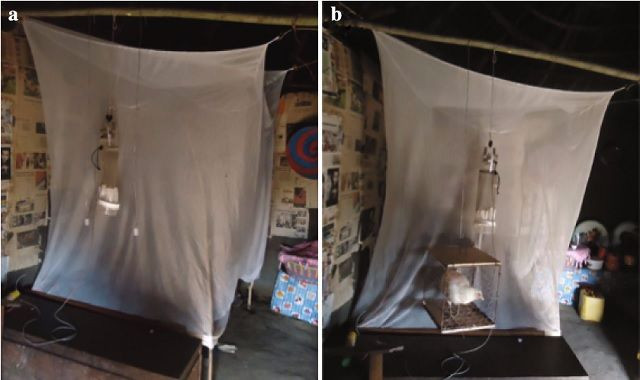Malaria Mosquitoes Don’t Like Chicken; Poultry-Scented Insect Repellent May Be Key To Disease Control

Synonymous as chickens are with being scared, it turns out there’s at least one fearsome and deadly animal that’s terrified of them: Mosquitoes. At least, that’s the verdict taken from a quirky new study published Wednesday in the Malaria Journal.
The group of Swedish researchers embarked on a series of novel experiments while they were stationed in Western Ethiopia in 2012. After documenting the blood-feeding patterns of female Anopheles arabiensis mosquitoes, one of the dominant causes of malaria in sub-Saharan Africa, they noticed a particular pattern. Across the three villages they studied, ones in which livestock commonly interacted with villagers, the type of animal the mosquitoes chose to bite differed depending on whether they were indoors or outdoors — people being the likely host when indoors, and cows when outdoors — but no matter what the environment, they practically never bit chickens.
“My group has a general interest in understanding how mosquitoes, including malaria mosquitoes, select and discriminate among potential blood hosts,” explained corresponding author Professor Richard Ignell of the Swedish University of Agricultural Sciences to Medical Daily. “Previous studies has shown that mosquitoes are able to discriminate among humans based on differences in specific odorants emitted. However, before our study there had been none that looked at odors from non-preferred blood hosts of mosquitoes.”
Based on what they saw in the villages, they theorized the bugs had an instinctive aversion to parfum de fowl.
To test that theory out, they collected hair, feather and wool samples from volunteer chickens, cows, sheep, people, and goats, and isolated the individual chemicals that made up their scent. Then they rigged a device to emit the synthetic version of these chemicals while a volunteer laid asleep nearby protected by bed netting, and a suction trap captured any enticed mosquitoes. To up the ante and provide a hilarious visual, they even let a live chicken stand guard near a volunteer in a fine mesh screen cage. Nine houses were individually treated with one of nine synthetic chemicals, including the four chicken-specific chemicals they identified, while another had the chicken sentry and the last contained a device that emitted no chemicals, serving as a control. To better protect against any potential bias, they even switched the placement of these devices (and chicken) in every house each night for 11 nights.
By experiment’s end, they found that mosquitoes visited the houses laced with chicken-specific chemicals or which were being guarded by a chicken much less often than they did the control house. Three of the chemicals shared by chickens and other animals also had a repellent effect.

Smelly Deterrents
While their study only looked at one specific species, it’s more than possible this effect can be seen in other disease-causing mosquitoes too. “Considering that mosquitoes often display some type of preference for their blood hosts — not all mosquitoes bite humans for example, and that they heavily rely on their sense of smell for finding their hosts and discriminate against others, it is very likely there are other similar repellents to be found elsewhere,” said Ignell.
As for why mosquitoes avoid chickens, the answer’s likely pretty simple. The ruffled feathers of a chicken (or any bird really) make it harder for them to gain access to their blood, and more importantly, chickens can easily scarf down any mosquitoes that try. The blood of chickens may also be nutritionally unappealing to them. Over the long span of evolution, the needling critters likely adapted and developed an ingrained scent-based fear of chickens.
It’s a fear that Ignell and his colleagues think is ripe for exploiting. And though it’s difficult to say for certain how their smelly deterrents might stack up to more conventional methods of mosquito control, their potential could be impressive.
“The repellents we identify seem to work as spatial repellents, i.e. they act over a rather long distance, which is in contrast to commercial mosquito repellents using DEET (considered the gold standard) that only are active at close range,” Ignell said. “The chicken-based repellents are not toxic so they cannot be compared with pesticides which have a special role not least in sub-Saharan Africa to keep the populations of malaria mosquitoes down.”
Given that mosquitoes are steadily becoming more resistant to pesticides though — making malaria control all the more difficult — any extra help in mosquito deterrence would be greatly appreciated, especially since the disease infected over 200 million people and killed nearly half a million worldwide last year. “At best the chicken-based repellents should be used in combination with the pesticides to further reduce the interaction between mosquitoes and humans,“ Ignell added.
Ignell’s team is eager to forge ahead with their research, though there’s obviously still a long way to go. “The next natural step would be to come up with a formulation, preferably using a biodegradable material, which would allow us to release the odorants over a longer time period under natural conditions,” he explained. “This would then have to be tested in both controlled settings, such as enclosures where we can study the direct effects of the repellents, and in the field to see if we can reduce mosquito-human interactions.“
As for whether chickens themselves could serve as malaria busters, Ignell is somewhat less optimistic. “The standing joke when we presented this work at meetings is that everyone should carry a chicken to prevent being bitten by malaria mosquitoes. Unfortunately that is not convenient for everyone,” he said. “Although chicken had free access to the houses in the villages we worked in, they did not act as sentries. This could be an interesting thing to look at.”
Source: Jaleta K, Hill S, Birgersson G, et al. Chicken volatiles repel host‑seeking malaria mosquitoes. Malaria Journal. 2016.
Published by Medicaldaily.com



























